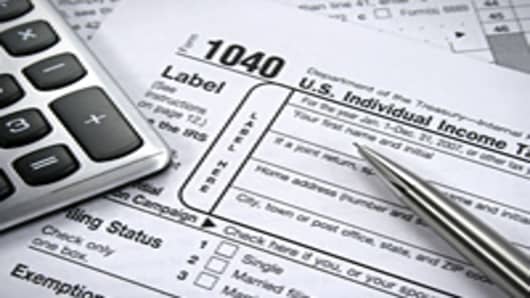First-timers -- individuals who haven't owned a residence in the last three years -- can claim up to $8,000. Current homeowners who've lived in their residence for five of the eight years before buying can get up to $6,500.
You must have a contract in place by April 30, 2010, and the deal closed by June 30 to qualify for the credit.
Even if your residential purchase is in 2010, you have the option to take the credit on your 2009 tax return or wait and claim it on your 2010 Form 1040. Run the numbers both ways to see which filing year will save you the most tax money.
Watch out for Making Work Pay complications.
To get more money into taxpayers' hands, the American Recovery and Reinvestment Act included a new tax break, the Making Work Pay credit. Rather than being a separate rebate check, this credit started showing up in worker paychecks last April. By the end of 2009, eligible employees received an extra $400.
Some workers, however, got more than they should have. This happened, for example, when a worker had two jobs. The new withholding rates meant that employee got $400 at each job, or twice the allowable credit amount. Similarly, a husband and wife who each had jobs could have received excess credit.
This filing season, taxpayers will have to fill out the new Schedule M to reconcile any credit overages. You might want to fill out the form early to see just what kind of tax damage you might face.
If you did encounter a Making Work Pay problem in 2009, consider adjusting your withholding early in 2010.
Now about that 2010 payout. Even if you don't make any W-4 changes, you'll see more tax withheld from your paychecks than was taken out after the Making Work Pay credit went into effect last year. When the credit took effect, the full $400 amount was paid out over just the last nine months of the year. But with the credit being paid out over all 12 months of 2010, this year's per-paycheck bump will be smaller.
Convert your traditional IRA to a Roth.
With the arrival of 2010, anyone can now convert a traditional IRA to a Roth retirement account. Before, shifting tax-deferred traditional IRA money into a tax-free Roth plan was not available to folks with adjusted gross income of $100,000 or more. That income limit has been removed.
If you decide this is the right retirement move for you, note that you will have to pay taxes on the previously untaxed amounts you convert. The good news is you can opt to pay half the conversion costs on your 2011 taxes, with the remainder in 2012.
Improve your home's energy efficiency.
Thanks to another portion of last year's stimulus bill, the tax savings for energy-efficient home improvements were themselves improved.
Instead of a complicated patchwork of credit amounts, homeowners can claim up to 30 percent of the first $5,000 spent on qualifying residential energy upgrades, or up to $1,500 in tax credits. If you want to go even greener, for example by installing a solar home heating system, you could get even bigger tax credits.
Next: Keep an eye on income, capital gains...Read more


